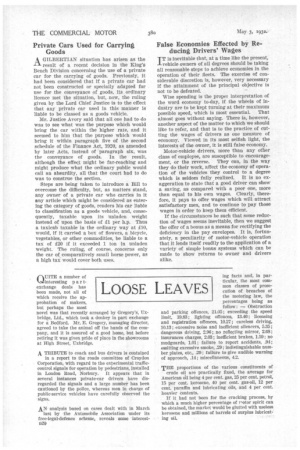Private Cars Used for Carrying Goods
Page 82

If you've noticed an error in this article please click here to report it so we can fix it.
A GILBEILTIAN situation has arisen as the I-1. result of a recent decision in the King's Bench Division concerning the use of a private car for the carrying of goods. Previously, it had been considered that if a private car had not been constructed or specially adapted for use for the conveyance of goods, its ordinary licence met the situation, but, now, the ruling given by the Lord Chief Justice is to the effect that any private car used in this manner is liable to be classed as a goods vehicle.
Mr. Justice Avory said that all one had to do was to see what was the purpose which would bring the car within the higher rate, and it seemed to him that the purpose which would bring it within paragraph five of the second schedule of the Finance Act, 1920, as amended by later Acts, instead of paragraph six, was the conveyance of goods. In the result, although the effeet might be far-reaching and might produce what the ordinary public would call an absurdity, all that the court had to do was to construe the section.
Steps are being taken to introduce a Bill to overcome the difficulty, but, as matters stand, any owner of a private car who carries in it any article which might be considered as entering the category of goods, renders his car liable to classification as a goods vehicle, and, consequently, taxable upon its unladen weight instead of upon the basis of £1 per h.p. Thus a taxicab taxable in the ordinary way at £10, would, If it carried a box of flowers, a bicycle, vegetables, or other commodities, be liable to a tax of £20 if it exceeded 1 ton in unladen weight. The ruling, of course, concerns only the car of comparatively small horse power, as a high tax would cover both uses.
















































































































































































